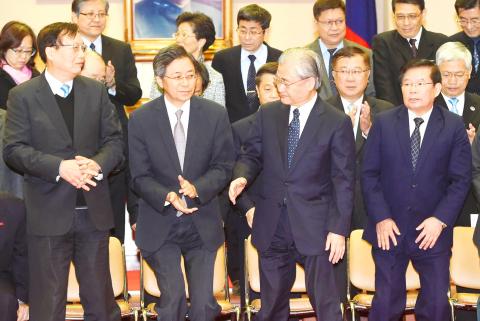Premier Mao Chi-kuo (毛治國) yesterday said the Cabinet, under his leadership, was resigning en masse, even though President Ma Ying-jeou (馬英九) said earlier in the day that he would not accept the resignation at this time.
Mao, who was appointed premier in late 2014, following the Chinese Nationalist Party’s (KMT) crushing defeat in local government elections, walked out of a special Cabinet meeting yesterday without taking questions.
Mao’s resignation came after the KMT lost both the presidential and legislative elections on Saturday, a matter of course in Taiwan when a ruling party loses a major election.

Photo: Liao Chen-huei, Taipei Times
Vice Premier Simon Chang (張善政) said that Mao is to take some time off, and Chang is to lead the Cabinet and other ministers until Ma decides whether to accept the Cabinet’s resignation.
Before Mao convened the special meeting, Ma went to Mao’s residence but did not find him there. Ma left after asking Mao’s wife to convey a message asking Mao to stay on.
The KMT offered to allow the Democratic Progressive Party (DPP) to form a Cabinet before its chairperson, president-elect Tsai Ing-wen (蔡英文), is sworn in on May 20, but the proposal appears to have been shot down.
In a post-election news conference late on Saturday, Tsai said that she would leave the issue of letting the party that holds the legislative majority form a Cabinet to constitutional procedure.
Taiwan’s Constitution does not allow for a Cabinet and a head of state from different parties.
Ma, whose second presidential term ends on May 20, yesterday said he is asking Tsai to reconsider her decision.
Meeting former deputy US secretary of state William Burns, Ma said it is necessary for the DPP to form a new Cabinet soon.
Meanwhile, Presidential Office spokesman Charles Chen (陳以信) yesterday said that Ma directed Presidential Office Secretary-General Tseng Yung-chuan (曾永權) to form a task force to prepare for the political transition.
The task force is to assign the transfer to a transition team designated by Tsai in accordance with related laws and regulations and based on the two previous power transitions in Taiwan, Chen said.
Tseng convened a meeting yesterday morning to begin preparations for the third transfer of power in Taiwan’s democratic history, Chen added.
The task force was formed to coordinate with the incoming administration to ensure a smooth transition of power in the four-month period between the election and the inauguration of the new president on May 20.

CHAOS: Iranians took to the streets playing celebratory music after reports of Khamenei’s death on Saturday, while mourners also gathered in Tehran yesterday Iranian Supreme Leader Ayatollah Ali Khamenei was killed in a major attack on Iran launched by Israel and the US, throwing the future of the Islamic republic into doubt and raising the risk of regional instability. Iranian state television and the state-run IRNA news agency announced the 86-year-old’s death early yesterday. US President Donald Trump said it gave Iranians their “greatest chance” to “take back” their country. The announcements came after a joint US and Israeli aerial bombardment that targeted Iranian military and governmental sites. Trump said the “heavy and pinpoint bombing” would continue through the week or as long

TRUST: The KMT said it respected the US’ timing and considerations, and hoped it would continue to honor its commitments to helping Taiwan bolster its defenses and deterrence US President Donald Trump is delaying a multibillion-dollar arms sale to Taiwan to ensure his visit to Beijing is successful, a New York Times report said. The weapons sales package has stalled in the US Department of State, the report said, citing US officials it did not identify. The White House has told agencies not to push forward ahead of Trump’s meeting with Chinese President Xi Jinping (習近平), it said. The two last month held a phone call to discuss trade and geopolitical flashpoints ahead of the summit. Xi raised the Taiwan issue and urged the US to handle arms sales to

State-run CPC Corp, Taiwan (CPC, 台灣中油) yesterday said that it had confirmed on Saturday night with its liquefied natural gas (LNG) and crude oil suppliers that shipments are proceeding as scheduled and that domestic supplies remain unaffected. The CPC yesterday announced the gasoline and diesel prices will rise by NT$0.2 and NT$0.4 per liter, respectively, starting Monday, citing Middle East tensions and blizzards in the eastern United States. CPC also iterated it has been reducing the proportion of crude oil imports from the Middle East and diversifying its supply sources in the past few years in response to geopolitical risks, expanding

An Emirates flight from Dubai arrived at Taiwan Taoyuan International Airport yesterday afternoon, the first service of the airline since the US and Israel launched strikes against Iran on Saturday. Flight EK366 took off from the United Arab Emirates (UAE) at 3:51am yesterday and landed at 4:02pm before taxiing to the airport’s D6 gate at Terminal 2 at 4:08pm, data from the airport and FlightAware, a global flight tracking site, showed. Of the 501 passengers on the flight, 275 were Taiwanese, including 96 group tour travelers, the data showed. Tourism Administration Deputy Director-General Huang He-ting (黃荷婷) greeted Taiwanese passengers at the airport and